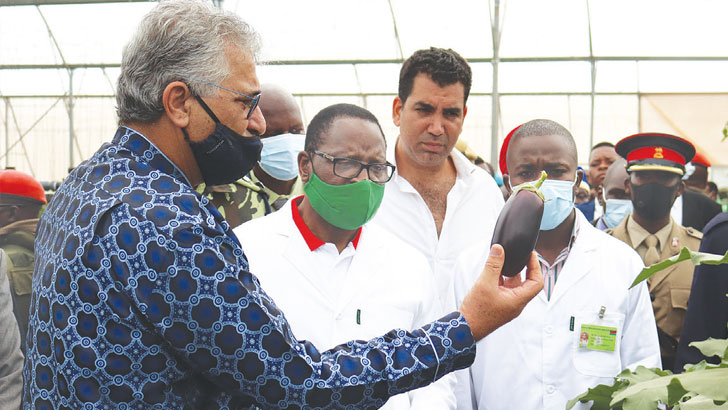Greenbelt Authority suffers K3bn budget cut
The Green Belt Authority (GBA) has seen Treasury slashing down its budget by K3 billion, a move the institution says will affect the implementation of its planned irrigation projects for agricultural transformation.
Making a presentation of the institutional budget needs before the Agriculture and Natural Resources Budget Cluster Committee of Parliament last week, GBA acting chief executive officer Amon Mluwira said they are geared to lead in large-scale commercial irrigation farming but without adequate funding, the efforts will be in vain as such projects attract huge investment.
The presentation followed a visit to horticultural greenhouse projects at Lumbadzi in Lilongwe and at Salima Sugar Factory.
Said Mluwira: “Our planned budget was around K5 billion

farm in Dowa
but Treasury has allocated us a K2 billion ceiling for only two projects covering Nchalo Cotton Project and Nthora Ilora Rice Scheme. Salima Sugar Factory, Lilongwe Greenhouses and other planned projects have not been funded.
“We are courting other investors on our own to complement where government is falling short, but we are very hopeful that after interaction with the Cluster Committee on Agriculture and Natural Resources, they will be able to lobby for us so we can have adequate funding in the coming financial year.”
On progress of their projects, Mluwira said the GBA has nine greenhouses on one hectare each, but the plan is to have 16 of them, if funding is provided.
The GBA is a l so expanding sugar cane fields at Salima Sugar Factory.
“Currently, we have about 2 000 hectares and the plan is to have 6 000 hectares which will also require money,” said Mluwira.
In his remarks, the budget cluster committee co-chairperson Sameer Suleman said after getting an update through the presentations and visiting the greenhouse at Lumbadzi and Salima Sugar Factory, the committee is convinced that the institution needs more funding.
He said: “We are impressed with progress made thus far. They deserve additional funds to accomplish their
plans. We are preaching about modernising and mechanising agriculture, and the GBA is in a better position to champion this national agenda.”
The authority was established by an Act of Parliament to champion irrigation investments in the country aimed at transforming the agriculture sector through implementation of mega irrigation projects.
Meanwhile, agricultural policy and development expert Tamani Nkhono Mvula has said agricultural transformation should involve public and private sectors where, for instance, government injects 40 percent while a private investor firm puts in 60 percent in a public private partnership (PPP) arrangement.
In an interview yesterday, Mvula said what the current inadequate budget allocation means the GBA’s efforts to woo private investors to partner it in a PPP arrangement will be frustrated and render the agricultural transformation plan a far-fetched dream.
He said at a time government resources are squeezed, the GBA is ideal to attract private investment for agricultural production and agro-processing ventures that Malawi needs for economic development.
Said Mvula: “It does not make sense to me to talk about agricultural transformation when the key responsible institution, the Greenbelt Authority, is being suffocated budget-wise. If we are talking about agricultural transformation without matching action, then it will be meaningless in line with the Malawi 2063 Vision pillars.”
National Smallholder Farmers Association in Malawi (Nasfam) chief executive officer Betty Chinyamunyamu, in a written response, concurred with Mvula, saying irrigation
is a catalyst to transforming agricultural production systems in the country.
She said: “The identified value chains have the potential to be successors to tobacco in earning forex as well as import substitution when we consider that they are high-value crops with multiple uses and, therefore, higher demand such as bamboo.”
However, Chinyamunyamu pointed out that what is critical is to examine the production models to ensure that they are inclusive of smallholder farmers in the target areas.
“In fact, the market must be the starting point so that production is targeted at specific identified markets and not first doing production and then struggling to find markets,” she advised.
Last month, the institution issued a statement calling for partnerships with willing private local and international investors in the implementation of massive irrigation and agro-processing projects.
In the statement, the institution, trading under the GBI Holdings Limited, said it plans to embark on mega irrigation and agro-processing joint venture projects that would spur economic development.
The plan by the GBA is in line with Malawi 2063 (MW2063) Vision which has agricultural production and productivity as some of its key pillars.
To fulfil the plans, the GBA said it is seeking serious local and international investors with financial capital to apply for the PPP joint venture irrigation projects.
The projects include rice irrigation scheme, cannabis (industrial and medicinal) irrigation scheme, bamboo plantation irrigation scheme, legumes irrigation scheme, livestock project and wheat irrigation scheme project, among others.
GBA has three known joint ventures with the Indian AUM Sugar and Allied Limited running Salima Sugar Company and with an Israeli company, Inosselia Agro Africa Limited running the horticultural Greenbelt Greenhouse Limited as well as the Nchalo Greenbelt Initiative Limited in partnership with Nchalo Smallholder Cane Growers Association.
There have been growing calls from experts for the country to embark on serious irrigation investments to spur economic development as Malawi has over the years been relying on rain-fed hand-held hoe agriculture whose outcome has been inconsistent due to climate change effects.





